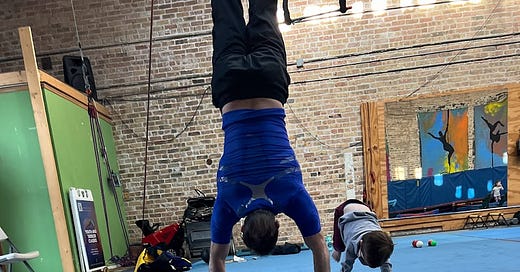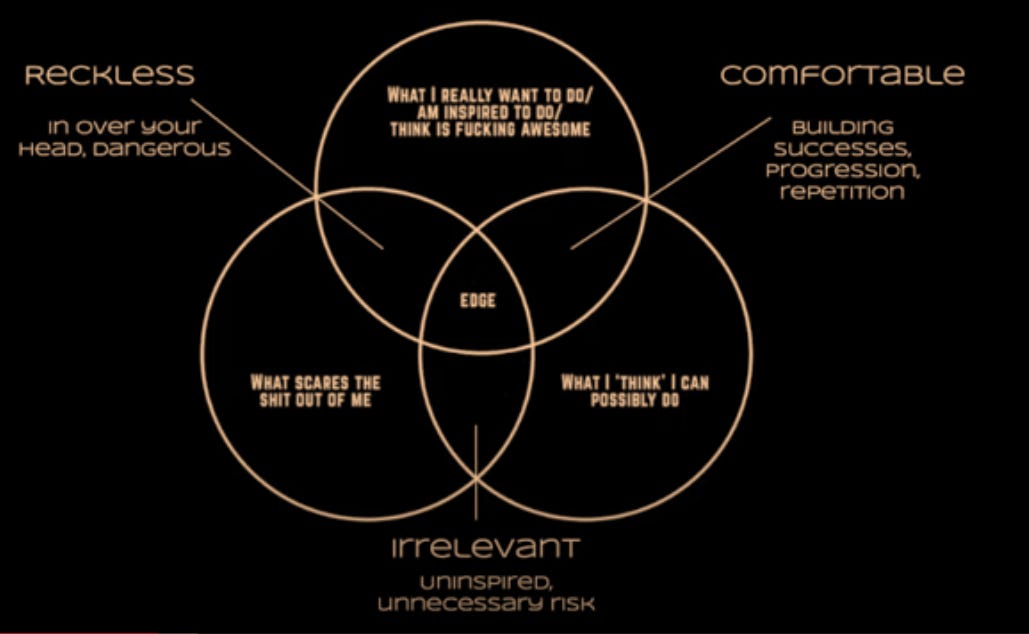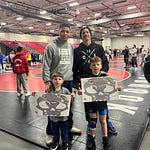🔥Welcome to Volume #00079!🔥
I’m Christian Champ. This is ☯️The Middle Way Newsletter ☯️. It is a place where I write, explore, share, and invite you along for the journey.
If you enjoy the newsletter please share it with your friends.
I’m writing another 30 essays and doing daily art on Twitter if you want to follow along.
🧩Ways to Help Us to Recognize and Change Our Patterns🧩
Last week we reflected on our patterns, emphasizing our ability to notice them. One of my readers reminded me that seeing our ways is a significant challenge.
I never see the books I've piled up around my house and need my wife to remind me (speaking of patterns to break).
A conversation over the weekend reminded me how often we get trapped in NOT SEEING what we do.
We need to use coaches, teachers, and friends to shine a light on our unseen patterns. We need the questions and prompts from external forces to make our patterns discernable.
My friend’s view gave me things to simmer and chew on, including offering up ways to see our patterns better.
What can we do to see our patterns better?
1/ Coaching
Coaches help us by asking difficult questions and letting us answer them. They gently and respectfully throw vexing questions our way, leading to new insights and approaches. They drive us to see the world and ourselves better.
Coaches work because they offer us a safe space to go deep and get personal. We don't worry about judgments or being defensive when we explore with them. They guide us as we shadow box with ourselves.
2/ Friends
We need to find like-minded friends unafraid to give honest feedback. They poke and prod us on our inconsistencies, pushing us to see a complete view of ourselves.
When we find good sparring partners, this works well. The difficulty with a friend is that our egos and history can stop us from going deep.
3/ Creating and Naming Themes
This trick puts us into another mental space. We step outside of our normal operating process to lean into the themes.
We can use themes for projects, time periods, or seasons.
My themes for 2020 include celebrating better. Celebrating is a challenge for me.
My mindset falls in the David Goggins camp of grind it out, do the work, and what's next. This approach generally works, but I fail to celebrate. What if I miss out on friends and community because we aren't celebrating? What if the celebration tells me I don't need to keep grinding and it's time to move on?
4/ Finding New Environments to Explore
We break our existing patterns by dropping into a new arena, which presses into a state of novelty.
Our environments include physical locations, digital locations, people, sounds, and objects.
I want to journal more in 2022. A forcing function I'm using to do this is dropping into a silent journaling session with folks at the Stoa (via zoom) before work.
When I journal without the drop-in, my words top out around 500. In thirty minutes of hanging out digitally, I hit 1,000+ words. It's harder to quit earlier or start late when we do things with others.
New environments create refreshed mindsets and places to explore and grow.
5/ Journaling and Reflecting
What comes up frequently? Why does it come up? What can we do about it?
Journaling answers these questions. The more we do this, the deeper we understand ourselves and notice our recurring stories.
When we journal, we see the patterns emerge, connecting our dots. We can then write about and investigate what happens when we make those connections.
6/ Adding Oblique Approaches
Instead of using our tried and true methods, we play with variant approaches noticing what changes.
This website shares a strategy from Brain Eno's Oblique Strategies. Each time we click on it, it offers an oblique approach for us to apply.
Today it told me to Imagine the piece as a set of disconnected events.
I used this idea to consider each point as separate and distinct instead of variations on a theme. This approach led me to the concept of practices.
7/ Have 1-2 Long Term Practices in Our Life
Practices ground us in our days and offer the feeling of slow and subtle pattern shifts. When we create long-term daily routines, we notice the changes taking place.
Death practices, mediation, Tai Chi, and other slow art practices hit the mark. It's a bonus if they include inner work, which allows us to feel into the change.
Pick One to Two of the Above Ingredients
Take that recipe and use them to find and change our patterns. The approach can radically change our world in a good way.
Adding these rituals to bring insight and self-discovery is a gift we give to ourselves.
We get to know ourselves better, creating our most potent foundation. It is an active life-enhancing approach.
📓Things to Think About📓
We are all leaders in some facet of our lives and improving this skill is a lifelong journey.
Ben notes how when Sachin joined the 76ers as the #2 of basketball operations:
He didn’t act or talk in a way that made anyone else feel beneath him. He didn’t convey any sense of his own importance. He wasn’t always in a rush to be somewhere. He didn’t talk over anyone else and he didn’t talk about himself. He didn’t assert authority. He didn’t even have his own office for his first few weeks full-time—he just sat in the open office area with scouts and player development staff and interns. In an industry not exactly known for its small egos, Sachin was a breath of fresh air.
How enjoyable is it to work and collaborate this way?
Working with someone like that is usually a recipe for ruffled feathers. But with Sachin, even if he was on the other side of a question from you, you never resented that intelligence and influence. That was in part because you knew that he was always after the best answer, whether it was his or not, and he’d happily vote to choose your suggestion when he thought you had the best argument. So the times where he did come out against you didn’t deflate your ego. You felt bigger, in fact, for having come to the best answer. Because it wasn’t your idea vs. his. It was him and you, together, hunting the truth.
His leadership superpower and what makes him a great leader is his ability to listen. He doesn’t use his authority or his voice. He listens and is genuine and transparent to enable his leadership to be successful.
It took me some time, but eventually I figured out: that was the magic. That was what tied it all together. The listening.
He didn’t have to have an opinion about everything, and he was incredibly good at knowing how much or little he knew. So when he was unsure, he would listen. He would find someone whose knowledge he respected in that area and bombard them with questions. (Of course, since it was Sachin, it would be the gentlest bombardment the other person had ever experienced.)
In a meeting, he’d say the least, but absorb the most. And at the end of it all, at the end of all that listening, he would synthesize all the points, reason through them, and give the most clear-eyed analysis of the situation.
We all need to lead more like Sachin and inspire others this way.
You can’t help but respect Sachin—his intellect, his principles, his character, his caring. The more you pay attention, the more you realize just how often he’s right. The more you listen, the more you realize how much you learn when he speaks. And the more you watch him operate, the more you want to emulate him—not just in effectiveness, but in style. His quiet strength and genuine selflessness stabilizes a group, brings clarity, removes noise. Because of who he is and how he treats others, he doesn’t need to coerce behavior—he inspires it.
A Letter from a Birmingham Jail By Ben Hunt
Ben reminds us of the power of narratives and how the civil rights movement boxed out people like his dad because they made MLK into a “criminal”. You didn’t want to associate with criminals, so this move took the movement off the board for people like his dad.
That MLK mug shot at the start of this note … that’s not from his Birmingham arrest, where he wrote his masterpiece “Letter From a Birmingham Jail”, but from his Montgomery arrest, where a grand jury indicted him and close to 100 others on felony charges of “conspiracy” against a business enterprise. MLK was sentenced to a $500 fine or a YEAR in the state penitentiary. No joke. More than a year, actually. He spent two weeks in jail before the fine was paid. For his words. For the criminal harm done by his “hate speech”, as it was defined then.
THAT’S the Narrative that my father heard. THAT’S the Narrative that moderate whites all over the South heard. It didn’t turn my father into a segregationist or a racist. But that was never the intent. The intent was to take my father off the political board. By constructing a dominant and immersive Narrative where opposing the status quo was defined as criminal, status quo institutions made it impossible for my father to actively support the civil rights movement. Why? Because to act in that way would mean self-identifying as a criminal, and that’s something my father would never do. It’s not that my father was oh-so concerned about the State seeing him as a criminal, although yeah, there’s that. My father’s pack was his family, and he wasn’t about to do anything that might draw the gaze of the State, which he distrusted immensely, onto his family. The bigger issue, though, was that my father could not abide seeing HIMSELF as a criminal, and that was the meaning of civil rights activism in the Narrative ocean in which 1960s Alabama white people swam: civil rights activism = criminality.
🎧Things to Listen, See, and Watch 🎧
Living at Your' Knife’s Edge: The Wisdom of Extreme Sports W/ Ari in the Air at the Stoa
Cycle of Inspiration => THE TICKET TO THE RIDE
Receive inspiration
Aspire to Achieve
Achieve
Edge Finder ==> Where Recklessness, Comfortable and Irrelevant comes together
Be 95% Comfortable 5% Edge
Spend 95% of time in —> What you think you can do/ what you want to do/what you are inspired to do = day to day practices that prepares you for the edge
Spend 5% on the Edge… really on the edge
Fear, Aliveness and Capacity —> sensitivity around these shows us our edge
Know what pushes us to want to go to the edge… what is our driver
Being wise is knowing the game and playing so you can play the game again (don’t die)
Everyone has a different edge… you need to become sensitive to what you are afraid of
Brinksmanship
Art of pushing a dangerous situation to the brink of safety in a wise way
Need this to stay on the 5% Edge
Physical and visceral thing with atoms and gravity (in his world) but could be social, career, relationship, emotional etc for us
Grounded in your life to be a good brinksman
Respect 95% / 5% Rule
Can always pull the plug and walk away. Practices walking away
Knows the risks
Respects the Brinks
rocks are hard, we are soft
Keeps a crew of brinks man
Can SEE other people
Supports them
Pushes them
Encourages them
Reverent of those who came before us
Be a Spiritual Hypeman
Know Your Edge and Know It’s Unique
If you don’t know it, find it!
Help push others to their edges
Leads by being at your edge
Affectionate and earnest in your desire to see people live on their edge
Radically encouraging and profoundly safe to be around
Community and being around others success and achievements is the emotional GOLD
Observant and sensitive
Knowing death is the deepest embodiment. Have a death practice
Flow state tunes you in if you turn up the risk, but embodied risk makes us learn
Society today puts up too many guardrails and we don’t understand risk by making everything hyper safe (see Covid)
People don’t understand the risk of going 75mph in a car … risk is misunderstood
I did a Twitter thread on Julia Galer’s book Scout Mindset. Click on it to see it all


💣Words of Wisdom💣
Dr. Martin Luther King (1963)
“When the architects of our republic wrote the magnificent words of the Constitution and the Declaration of Independence, they were signing a promissory note to which every American was to fall heir.”
Margaret J. Wheatley
"Insight or discernment is the capacity to see clearly, to become aware of all the many elements and dynamics that are at play and then use that knowledge skillfully to find right action. We can't act skillfully if we can't see the situation fully."
Kay Larson, Where the Heart Beats
"My intention has been, often, to say what I had to say in a way that would exemplify it; that would, conceivably, permit the listener to experience what I had to say rather than just hear about it. —John Cage”
Rory Sutherland, Alchemy
"We discovered that problems almost always have a plethora of seemingly irrational solutions waiting to be discovered, but that nobody is looking for them; everyone is too preoccupied with logic to look anywhere else."
Byung-Chul Han, Disappearance of Rituals
"The 19th century discovered work, and play became increasingly distrusted. There was now much more work than play: the world resembled a factory rather than a theatre.”
Anders Ericsson, Peak
"The key change that occurs in our adaptable brains in response to deliberate practice is the development of better mental representations, which in turn open up new possibilities for improved performance."
Diana Beresford-Kroeger, To Speak for the Trees
"The Celts built this responsibility into their culture. On that first medicine walk with Nellie, she taught me that the most fundamental rule in harvesting nature's bounty was to "always leave enough for the seventh generation."
🙏Thanks for reading🙏
Which strategy do you want to employ? What do you want to see from the results? When you finish, notice what surprised you?
Any thoughts or comments, please share!
Namaste,
Christian
The almost three-year-old is getting into the handstand game. Let’s go…




















Share this post